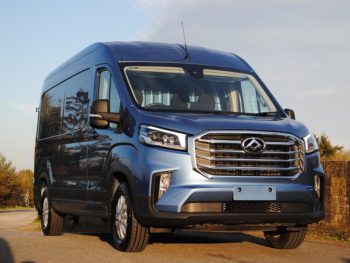UK registrations of light commercial vehicles fell by 26.9% in January to 17,566 registrations, compared with a bumper January last year.

But although the data from the Society of Motor Manufacturers and Traders (SMMT) shows it was the weakest start to a year since 2013, it also stressed that January has historically been a volatile month due to the intermittent nature of fleet renewal.
The decline comes on the back of the best January for 31 years in 2021, when registrations hit 24,029 units, up 2.0% even on a pre-pandemic January 2020, thanks to new models and latest deals.
Small vans, less than or equal to two tonnes, saw the biggest fall this January, with registrations more than halving (down 53.9%). Medium-sized vehicles over 2.5 tonnes, which represent two-thirds of the LCV market, fell by 29.8%. Pickup sales declined by 17.4%, but 4x4s recorded a 196.8% increase – although they remain a fractional segment.
Bucking the overall decline, demand for battery electric vehicles rose 21.4% with 647 units registered, some 3.7% of the overall market. While diesel still took a 94.3% market share, electric vans are expected to erode this further over the year as a result of key new model launches; eLCV uptake is predicted to climb by 81.3% this year to 23,130 units, which would represent 6.4% of the market, compared with 3.6% or 12,759 units in 2021. Roughly one in 16 new vans will be fully electric in 2022 while eLCV registrations are predicted to rise a further 57.6% next year, to a market share of 9.4%.
The overall LCV sector is predicted to grow 2.0% overall in 2022, to 362,620 units; just shy of the 365,778 vehicles registered in 2019 and only 3.5% below the sector’s record year of 2016.
2023, meanwhile, is expected to continue this growth, with 387,420 registrations, overtaking 2019 and even 2016 volumes to set a new market record.
Mike Hawes, SMMT chief executive, said: “While chip shortages, rising inflation and increased energy costs will have an impact, growth is still anticipated given the inexorable rise of home deliveries and broader economic recovery. With more battery-powered vans coming to market, the demand for these new technologies seen in January is likely to continue across the year. With uptake rates still lagging the new car market, which has the same end of sale date, the importance of bringing every lever – purchase incentives, fiscal measures and recharging infrastructure investment – to bear on this critical sector is self-evident.”
Analysis of the SMMT data by the National Franchised Dealers Association (NFDA) reveals that as usual, the January market was dominated by Ford registrations with a 35.53% share, followed by Vauxhall with a share of 12.59% and Volkswagen with a 10.3% market share.
It also noted an increase in registrations of Maxus vehicles, including its Deliver 9 van that brings a rival to the large Transit and sells at a value price. Supported by a growing range of eLCVs, Maxus could become a bigger player going forward.
Sue Robinson, chief executive, added: “Overall, dealers’ feedback is positive, with supply and deliveries playing a crucial role in the market as there are no reports of shortage of customers wanting to buy new or used light commercials.”

